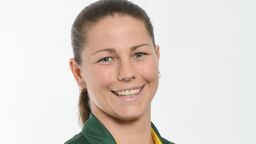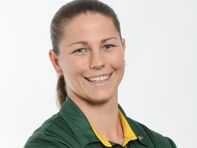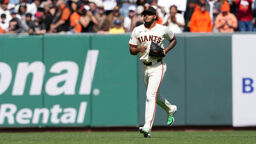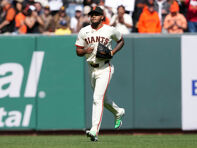By Cyd Zeigler
 Miami seniors including LoVerde (2nd from left) and Miele (right). Photo credit Rachel Lewis. |
But that language has no place in the Miami (Ohio) hockey program. Having experienced the coming out and untimely death of openly gay student manager Brendan Burke just over a year ago, the team’s awareness of gay issues is unlike any other in NCAA hockey, and maybe all of NCAA men’s sports.
“After Brendan came out I realized that those words shouldn’t be used, even in slang,” said junior forward Trent Vogelhuber, who admits he once liberally tossed around anti-gay slurs. “[Brendan] said he didn’t take it personally, but he noticed when those words were used. I just made a conscious effort to not use the words he might feel uncomfortable around.”
Junior defenseman Chris Wideman said he was fully accepting of gay people before Burke’s revelation to the team; Anti-gay slurs have never been on the tip of his tongue.
“It’s not a way to live,” Wideman said. “It’s offensive and hurtful to a group of people who don’t deserve that. You don’t hear anybody walking around dropping racial slurs all the time.”
Taking it to the NHL
Team assistant captain Andy Miele was one of the best players in NCAA hockey this year. He was named the 2011 Player of the Year for the Central Collegiate Hockey Association (the top conference in hockey in 2011); He not only led the nation in points (71) and assists (47), but he scored the most points in a season in Division 1 since 2003; and his 56 points in conference are the most in two decades.
Miele’s staggering numbers don’t feed into the stereotypical image of a man who would champion gay equality, but Miele has become an outspoken advocate for acceptance of gay people both in sports and beyond. A close friend of Burke, Miele remembers times dancing with his gay friend at a local bar; And he doesn’t care who knows it.
Miele’s agent, Scott Norton, said 12 NHL teams are pursuing Miele for next season. Patrick Burke, brother of Brendan and a scout for the Philadelphia Flyers, could not praise Miele highly enough.
“The fact that numerous NHL teams are competing to sign Andy shows how well-respected he is,” Patrick said. “Whatever team he chooses is getting a tremendous hockey player and an even better person.”
What if one of those teams doesn’t like the fact that he is so vocally pro-gay?
“If someone wants to look down upon me because of my feelings on this issue, that’s their loss,” Miele said. “You play hockey because of the way you play it, not because of your outlook on certain issues.”
Miele said hearing the word “faggot” casually tossed around a professional locker room would likely not drive him to action, particularly in his first year. However, if he heard a pro teammate use a homophobic slur directed at a gay person, he would start a conversation.
Much like the NFL’s Scott Fujita has said, senior defenseman Vincent LoVerde wouldn’t hesitate to question another player who used the word “faggot” in a professional locker room.
“I’d say something,” LoVerde said. “I’m pretty stubborn. I’d ask him why he hates gay people, that they’re just like him and me.”
The gay-positive attitude certainly hasn’t hurt the Miami team. They finished second in the nation in 2009, losing an overtime thriller in the championship. In 2010, they returned to the Frozen Four and lost in the national semifinals. This year they were ranked No. 5 in the nation but lost in the round of 16.
The Showers
While locker room banter is certainly at the forefront of gay athletes’ minds, it’s the showers that often concern straight jocks. The idea of being naked and showering next to an openly gay man makes otherwise confident, masculine athletes become illogically insecure. It’s an issue Burke was very open about with his team.
“The coaches were naked in front of Brendan Burke every day and we never thought twice about it,” said head coach Enrico Blasi. “I would expect my players to act the same way.”
That attitude has trickled to seemingly Blasi’s entire team; Everyone we spoke to for this article resounded an acceptance of a gay player in the locker room.
“One stereotype that people have about gay people is that they’re predators and they’re going to come on to straight guys,” said Chris Wideman. “But the one thing I learned from Brendan is that’s not how it is. The idea that a gay guy is going to force himself on you in a shower is totally unrealistic.”
Miele said he has learned not to fear the mythic pack of crazed gays wandering through locker rooms looking for naked straight men to attack.
“They see you as teammates and nothing else,” Miele said. “You’re not going to be put into situations where they’re going to make a move on you.”
Vogelhuber was drafted by the Columbus Blue Jackets in 2007 but opted to pursue an education before hitting the pros. He admits the idea might take some adjustment.
“Maybe there would be a period of getting used to it,” he said. “But if I had a gay teammate and were showering next to him, I’d grow to not think about it and be comfortable with it, but at the beginning it might be at the back of my mind.”
LoVerde, who describes himself as a bluecollar player, said it wouldn’t be an issue for him at all.
“I wouldn’t have a problem with showering with a gay teammate,” he said. “I’m comfortable with who I am. I can’t see myself having a problem.”
Homophobia has no place
While a gay player would be welcomed with open arms onto the team and into the locker room, a vocal openly homophobic player would have a tough time surviving on the team.
“That wouldn’t be acceptable in our program,” said head coach Enrico Blasi. “I’d give him an opportunity to grow and change, or we’d have to make some changes. This isn’t about anything but being a good person. If you’re judging [gay people], then you’re going to judge other things, and if you’re judging other things that means you’re not buying into the program. It just leads into a bad downward spiral. That’s not what we’re about here at Miami. I think it’s pretty well-known that if you’re going to come to Miami you’re going to be in an open family relationship-type of program. And if you don’t want that then don’t come to Miami.”
When asked if all of this translated into an invitation to gay hockey players, both out and closeted, to come to Miami, players and coach laid out the welcome mat.
“A gay teammate would definitely feel welcome in our environment, and I like to think they would want to come here,” said Vogelhuber.
The gay-positive environment on the team is something Miele takes great pride in.
“Before Burkie, I don’t know if a player would have come out on the team,” he said. “But now, I think someone would come out because they know the support they’d have and they wouldn’t be judged.
“We’re a very accepting group, and that starts with our coaching staff. They’ve made it so acceptable for any kind of person to come to his program. Especially the way our coaching staff took to Brendan after he came out, it was unbelievable. This is the best environment in NCAA hockey that I’ve seen for gay people.”







































